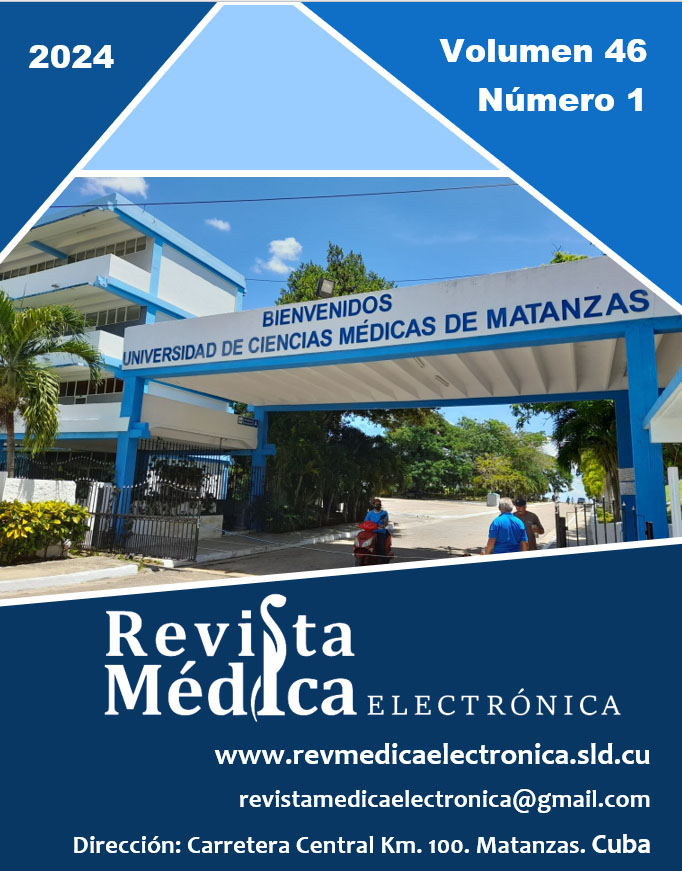Doping and mental health: attitudes and beliefs in high performance Cuban athletes
Keywords:
attitudes, beliefs, doping, sport, high performance, well-being, mental health, preventionAbstract
Introduction: To contribute to the mental health of the high-performance athlete, in addition to other psychological factors, it is important to know the beliefs and attitudes in the athletes about doping, in order to enhance educational work, mental health, and psychological well-being.
Objective: To determine beliefs and attitudes in elite Cuban athletes of maximum performance regarding doping.
Methods: A non-experimental, descriptive study was carried out in three hundred national pre-selection athletes (n = 37). The Attitudes and Beliefs about Doping Scale was applied, with empirical distribution of frequencies, means, and standard deviation, as well as the Kaiser-Meyer-Olkin and Bartlett test for factorial analysis, and the Pearson Chi2 test.
Results: 50 % of athletes have beliefs and attitudes of rejection toward doping.
Conclusions: Attitudes of rejection and the majority of correct beliefs on the subject are the factors that athletes recognize as those having the greatest impact on the appearance of doping-prone behaviors. Although arguments have been demonstrated that point toward certain beliefs of approach to doping, specifically as a way to achieve significant sport results, enhance performance, and obtain economic benefits, there are values such as honesty and responsibility that prevail as guiding elements for behaviors not associated with the use of doping, and that contribute to their mental health.
Downloads
References
2. Cañizares M, Huie M. Injuries and psychological resilience in elite cuban athletes. In Advances in Psychology Research. Nueva York: Nova Science publishers, Inc.; 2022.
3. Pino Hinds O, Cañizares Hernández M, Suárez de Armas S. Factores personales protectores, autoeficacia y resiliencia en un deportista de lucha grecorromana de alto rendimiento. Rev Cub Med Dep & Cult Fis [Internet]. 2021 [citado 12/04/2024];16(3). Disponible en: http://www.revmedep.sld.cu/index.php/medep/article/view/512
4. Scull Ortiz AB, Caballero RM, Hernández MC, et al. Bienestar psicológico, y vínculo deportivo en nadadores de la selección nacional cubana. Rev Olimpia [Internet]. 2024 [citado 12/04/2024];21(2):87-98. Disponible en: https://revistas.udg.co.cu/index.php/olimpia/article/view/4410
5. Mon-López D, Tejero-González CM, Calero S. Recent changes in women’s Olympic shooting and effects in performance. PloS One. 2019;14(5):e0216390. DOI: 10.1371/journal.pone.0216390.
6. Calero-Morales S, Villavicencio-Álvarez VE, Flores-Abad E, et al. Pedagogical control scales of vertical jumping performance in untrained adolescents (13–16 years): research by strata. PeerJ. 2024;12:e17298. DOI: 10.7717/peerj.17298.
7. Mainer-Pardos E, Villavicencio Álvarez VE, Moreno-Apellaniz N, et al. Effects of a neuromuscular training program on the performance and inter-limb asymmetries in highly trained junior male tennis players. Heliyon. 2024;10(5):e27081. DOI: 10.1016/j.heliyon.2024.e27081.
8. Roso-Moliner A, Gonzalo-Skok O, Villavicencio-Álvarez VE, et al. Analyzing the Influence of Speed and Jumping Performance Metrics on Percentage Change of Direction Deficit in Adolescent Female Soccer Players. Life. 2024;14(4):466. DOI: 10.3390/life14040466.
9. Zamora-Solé R, Alcaraz S, Regüela S, et al. Experiences of Olympic Hopefuls of the Disruption of the Olympic Cycle at Tokyo 2020. Apunts. 2022;148:1-9. DOI: 10.5672/apunts.2014-0983.es.(2022/2).148.01.
10. Suárez Armas S, Cañizares Hernández M, Carvajal Veitía W. Actitudes y creencias de deportistas cubanos de alto rendimiento sobre el dopaje. Cuad Psicol Deporte. 2022;22(2):136-55. DOI: 10.6018/cpd.485361.
11. Domínguez R, Dosil Díaz J. Variables psicológicas y fortaleza mental en jugadores/as profesionales de Baloncesto. Cuad Psicol Deporte. 2024;24(1):60-79. DOI: 10.6018/cpd.576011.
12. Álvarez J, Nuviala A, Oliete E et al. Conocimientos, actitudes, creencias de los jóvenes españoles en materia de dopaje. Rev Iberoam Psicol Ejerc Deporte [Internet]. 2020 [citado 13/04/2024];15(1):103-8. Disponible en: https://zaguan.unizar.es/record/98209/files/texto_completo.pdf?version=1
13. Puchades M, Molina P. Actitudes hacia el dopaje en estudiantes de ciencias del deporte. Apunts. 2020;2(140):1-7. DOI: 10.5672/apunts.2014-0983.es.(2020/2).140.01.
14. Calero Morales S, Fernández Lorenzo A, Chávez Cevallos E, et al. Anomalies in effectiveness: A mathematical model used in international volleyball. Retos. 2017;32:194-8. DOI: 10.47197/retos.v0i32.49650.
15. Listiani D, Umar F, Riyadi S. Athletes’ (Anti) Doping Knowledge: A Systematic Review. Retos. 2024;56:810-6. DOI: 10.47197/retos.v56.105029.
16. Yanazawa K, Sugasawa T, Aoki K, et al. Development of a gene doping detection method to detect overexpressed human follistatin using an adenovirus vector in mice. PeerJ. 2021;9:e12285. DOI: 10.7717/peerj.12285.
17. Kedir HM, Kemal HS, Mekonen ZT, et al. Pharmacy professionals’ knowledge, attitude and practice towards doping in sports: A Cross-sectional study in Ethiopia. Heliyon. 2023;9(11):e21207. DOI: 10.1016/j.heliyon.2023.e21207.
18. Hair J, Anderson R, Tatham R, et al. Multivariate Data Analysis. 6ta ed. Estados Unidos: Pearson/Education; 2016.
19. Dauval Borges CD, Menéndez Díaz JL, Torres Caldas A. Diagnóstico del conocimiento sobre doping en responsables y beneficiarios de gimnasios comunitarios del municipio Cienfuegos. Revista Universidad y Sociedad [Internet]. 2019 [citado 13/04/2024];11(3):154-8. Disponible en: http://scielo.sld.cu/scielo.php?pid=S2218-36202019000300154&script=sci_arttext&tlng=pt
20. Moran A, Guerin S, Kirby K, et al. The development and validation of a doping attitudes and behaviour scale. Report to World Anti-Doping Agency & The Irish Sports Council. Dublin: UCD School of Psychology; 2008.
21. Ortega G, Robles J, Abad MT, et al. The Promotion of Values in Young People in Different Contexts of Sports Practice. J Sports Psychol [Internet]. 2021 [citado 13/04/2024];30(2):122-31. Disponible en: https://rpd-online.com/index.php/rpd/article/view/359
22. Moston S, Engelberg T, Skinner J. Investigative interviewing and anti-doping developments in Australia. Investigative Interviewing Research and Practice [Internet]. 2013 [citado 13/04/2024];5(2):144-9. Disponible en: https://core.ac.uk/download/pdf/143878921.pdf
23. Salas-Ramírez K, Rojas-Valverde D. Attitudes Towards Dopping and Perfectionism in Soccer, Indoor Soccer, and Basketball Professional Athletes in Costa Rica. MHSalud. 2019;16(1):1-14. DOI: 10.15359/mhs.16-1.5.
24. Morente-Sánchez J, Zabala M. Doping in sport: a review of elite athletes’ attitudes, beliefs, and knowledge. Sports medicine. 2013;43(6):395-411. DOI: 10.1007/s40279-013-0037-x.
25. Ruiz-Rico GJ, Zagalaz Sánchez ML, Zurita Ortega F, et al. Actitudes hacia el dopaje según el deporte practicado por los jóvenes. Apunts. 2017;130:29-39. DOI: 10.5672/apunts.2014-0983.es.(2017/4).130.03.
Downloads
Published
How to Cite
Issue
Section
License
All content published in this journal is Open Access, distributed under the terms of the CC BY-NC 4.0 License.
It allows:
- Copy and redistribute published material in any medium or format.
- Adapt the content.
This will be done under the following terms:
- Attribute the authors' credits and indicate whether changes were made, in which case it must be in a reasonable way.
- Non-commercial use.
- Recognize the journal where it is published.
The copyrights of each article are maintained, without restrictions.






